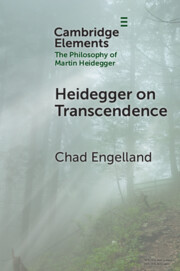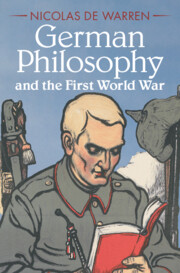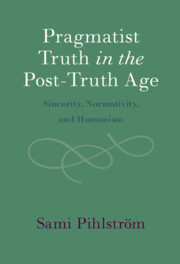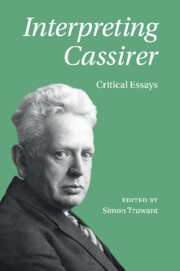Refine search
Actions for selected content:
23 results
Constitutional Heteronomy in Kant’s Legal Theory: An Internal Critique
-
- Journal:
- German Law Journal ,
- Published online by Cambridge University Press:
- 24 November 2025, pp. 1-19
-
- Article
-
- You have access
- Open access
- HTML
- Export citation
What is Christian Philosophy and Who is a Christian Philosopher? Richard Schaeffler as an Example
-
- Journal:
- New Blackfriars ,
- Published online by Cambridge University Press:
- 25 July 2025, pp. 1-16
-
- Article
- Export citation

Heidegger on Transcendence
-
- Published online:
- 28 May 2025
- Print publication:
- 12 June 2025
-
- Element
- Export citation
The Nature of the Critique of Pure Reason and the Architectonic Unity of Metaphysics: A Response to my Critics
-
- Journal:
- Kantian Review / Volume 29 / Issue 1 / March 2024
- Published online by Cambridge University Press:
- 22 January 2024, pp. 135-151
- Print publication:
- March 2024
-
- Article
-
- You have access
- Open access
- HTML
- Export citation
Conclusion
- from Part IV - Kant on Dogmatism and Scepticism
-
- Book:
- Kant's <I>Critique of Pure Reason</I> and the Method of Metaphysics
- Published online:
- 11 May 2023
- Print publication:
- 25 May 2023, pp 267-269
-
- Chapter
- Export citation
Chapter 2 - The Critique of Pure Reason as the Doctrine of Method of Metaphysics
- from Part I - Metaphysics as a Science and the Role of the Critique of Pure Reason
-
- Book:
- Kant's <I>Critique of Pure Reason</I> and the Method of Metaphysics
- Published online:
- 11 May 2023
- Print publication:
- 25 May 2023, pp 41-64
-
- Chapter
- Export citation
Introduction
-
- Book:
- Kant's <I>Critique of Pure Reason</I> and the Method of Metaphysics
- Published online:
- 11 May 2023
- Print publication:
- 25 May 2023, pp 1-14
-
- Chapter
- Export citation

Kant's Critique of Pure Reason and the Method of Metaphysics
-
- Published online:
- 11 May 2023
- Print publication:
- 25 May 2023
Introduction
-
- Book:
- German Philosophy and the First World War
- Published online:
- 30 March 2023
- Print publication:
- 20 April 2023, pp 1-11
-
- Chapter
- Export citation
Chapter 10 - The Tragedy of the Person
-
- Book:
- German Philosophy and the First World War
- Published online:
- 30 March 2023
- Print publication:
- 20 April 2023, pp 367-400
-
- Chapter
- Export citation

German Philosophy and the First World War
-
- Published online:
- 30 March 2023
- Print publication:
- 20 April 2023
4 - Receptivity or Spontaneity
- from Part I - The Lasting Meaning of Kant’s Thought
-
- Book:
- Cassirer and Heidegger in Davos
- Published online:
- 05 May 2022
- Print publication:
- 19 May 2022, pp 85-108
-
- Chapter
- Export citation
2 - Cassirer’s Transformation of the Critique of Reason into a Critique of Culture
- from Part I - The Lasting Meaning of Kant’s Thought
-
- Book:
- Cassirer and Heidegger in Davos
- Published online:
- 05 May 2022
- Print publication:
- 19 May 2022, pp 47-61
-
- Chapter
- Export citation
3 - Heidegger’s Reading of Transcendental Philosophy as Phenomenological Ontology
- from Part I - The Lasting Meaning of Kant’s Thought
-
- Book:
- Cassirer and Heidegger in Davos
- Published online:
- 05 May 2022
- Print publication:
- 19 May 2022, pp 62-84
-
- Chapter
- Export citation
Kant’s Letter to Fichte, the Pure Intellect and his ‘All-Crushing’ Metaphysics: Comments on De Boer’s Kant’s Reform of Metaphysics
-
- Journal:
- Kantian Review / Volume 27 / Issue 1 / March 2022
- Published online by Cambridge University Press:
- 21 February 2022, pp. 119-125
- Print publication:
- March 2022
-
- Article
- Export citation
Chapter 3 - Around or through Kant?
-
- Book:
- Pragmatist Truth in the Post-Truth Age
- Published online:
- 14 September 2021
- Print publication:
- 23 September 2021, pp 69-100
-
- Chapter
- Export citation
Introduction
-
- Book:
- Pragmatist Truth in the Post-Truth Age
- Published online:
- 14 September 2021
- Print publication:
- 23 September 2021, pp 1-11
-
- Chapter
- Export citation
Chapter 5 - How Is Normativity Possible?
-
- Book:
- Pragmatist Truth in the Post-Truth Age
- Published online:
- 14 September 2021
- Print publication:
- 23 September 2021, pp 144-177
-
- Chapter
- Export citation

Pragmatist Truth in the Post-Truth Age
- Sincerity, Normativity, and Humanism
-
- Published online:
- 14 September 2021
- Print publication:
- 23 September 2021

Interpreting Cassirer
- Critical Essays
-
- Published online:
- 17 April 2021
- Print publication:
- 01 April 2021
